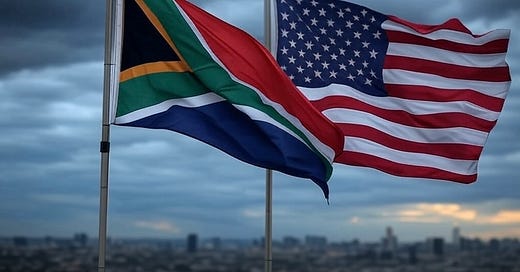I've spent the better part of this morning taking a closer look at the foreign policy emerging from Washington, country by country, over the past two weeks. I'm going to go out on a risky limb that I might rue later - buyer beware the speculation. I do not foresee this American regime sanctioning South Africa because big “L” Liberals, aka Progressives, have never been particularly good at understanding the world. Their over-concentration in the chattering classes means they fail to grasp what the United States is currently doing. I started writing a longer essay on this, going country-by-country, but it turned into a hot mess.
What follows is that globalization will not be a return to Mercantilism and trade wars - at least not of the sort we knew in the time of Smith and steamships. The Americans are currently on a worldwide roadshow of what’s best termed “Friendshoring.” It does not resemble the 600-step supply chains crisscrossing Asia for security reasons, but it does require resources, labor, and security at varying price points and stages of demographic maturity. The ever-shrewd Japanese were the first to hop on this bandwagon during Trump 1.0, and they’ve printed themselves a golden ticket to ride on the coattails of Washington ever since.
In a perfect world, we should be flattered that the United States has even considered us - and with a rather light touch, although it may not seem that way at the moment. I’m going to attract a lot of blowback for this, but Donald Trump understands public displays of strength when necessary. I doubt he took the “bullying” comments personally. He is also excessively flattering and generous when shown loyalty. King Abdullah II of Jordan just received the whole high-praise and foot massage treatment for moving the needle on Gaza.
Joel Pollak has tried to tell us this recently - that this could be the best thing to happen to us. It’s suspicious, in its silence, that the entire apparatus of the ICJ has found itself under such intense pressure of frozen assets and sanctions, yet we’ve only seen mild exhibitions of university politics radicals that at least seven members of the White House Transition Teams (all native-born South Africans) have known about for years. And that’s underselling the fact that U.S. military intelligence has a large AFRICOM base in Gaborone, staffed by some suspiciously pale faces in suits, just 250km from Pretoria.
Even so, it would not require kicking the chair legs out from under this economy with sanctions. Sanctions would be punitive only if the United States sees its national security significantly undermined by a defiant but not aggressive state on the southern tip of Africa - and the answer is…that’s unlikely. This is not the Pan Am Lockerbie bombing. We lack both the capabilities and sophistication to do anything more than reactivate the old Silvermine listening post the Americans ran as a favour from the last regime to monitor maritime traffic astride the Atlantic and Indian oceans, as a favoru to Beijing. This is not the jewel in the crown of the Belt and Road.
While I know some of you don’t have a favorable view of Joel Pollak, I was taken aback that, despite everything that’s happened, the message he brings - personally, as he cannot engage diplomatically with the authority of a post he has not yet been given - remains that the United States wants economic partners who are growing.
That is not a tall ask if the chips fall that way. And while you won’t hear it in the bumbling invectives of Professor Opinion Piece Crazy Eyes from the WITS PPE Center of Social Solidarity - because our cackling classes would not only die on the hill of Social Justice and Equality, they’d slaughter a whole herd of lambs on the altar of that hill before lunging the dagger into their chests with relish - this ask would require that our notoriously ideological and greedy political class not even be asked to give that up. It would require them to search their souls after these long years and consider a different kind of greed.
This might, perhaps, give our leaders something to think about as they tour Europe, looking for friends to buff some shine into their recently battered reputations. The lights are on in Washington, but nobody’s home to receive them, while American diplomats continue their world tour probing the fractious landscape for new allies.





"It does not resemble the 600-step supply chains crisscrossing Asia for security reasons, but it does require resources, labor, and security at varying price points and stages of demographic maturity. " - Agreed, the problem seems to be that even in old established allies, America want's to enact regime change (judging by their recent speech at the Munich security council), it's difficult to tell who they see as a friend and how the will "reward them with blessings". I sense that the current American leadership will end up isolating America and that the world will look for ways of moving ahead without needing to rely on them for economic prosperity and defense.